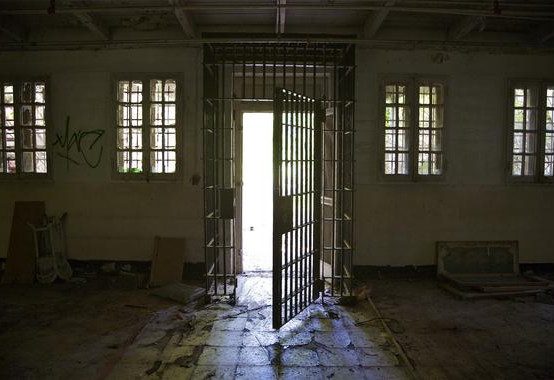Discipline and Rupture at Christmastime

There are authors whose work so permeates our intellectual atmosphere that by the time we get around to reading them (instead of just gesturing at them), they’re simultaneously familiar and revelatory. This Advent I’m finally reading Michel Foucault’s Discipline and Punish: The Birth of the Prison, and Jean-Pierre de Caussade’s Abandonment to Divine Providence. They’re unexpectedly in harmony; and their harmony, it turns out, is a carol.
Discipline and Punish weaves a network of several central concepts: surveillance, habit, norm, discipline, delinquency, science. The modern concept of the self, Foucault argues, is born from these concepts. Discipline is the program by which we develop habits, by which we become predictable, and therefore the means by which it becomes possible to judge not merely our behavior but our character against a unitary human norm. The social sciences are based on the ideal of discipline. Through surveillance a body of knowledge is created about human habits, an anthropology emerges to categorize humans according to how closely they hew to a societal norm, and those who fall farthest from the norm are categorized as delinquents. Behavior has become character. We can know a man. And we know him by observing his habits. The prison (and its fraternal twin, prison reform) exists to change men’s habits through especially intense applications of discipline.
The counternarrative is a narrative of rupture. Rupture is the breaking in of some outside force that can crack the shell of habit and overthrow the laws—the penal laws as well as the “laws of nature” discerned by the social sciences. Torture, in Foucault, is a spectacle of rupture; but so is the king’s pardon. On an individual level rupture is what makes human souls unknowable. A Christian reader will immediately see in “rupture” the hidden terms of repentance, forgiveness, and above all grace.
De Caussade is maybe less consistent than Foucault, or maybe just less resonant with my own spiritual needs. But this 18th-century French priest (who worked well within the historical period of Foucault’s study) has written an extended paean to the counternarrative. De Caussade is a poet of rupture.
Instead of a behavioral norm, he gives us a man, Jesus: “Jesus Christ did not restrict himself, for he did not follow all his own precepts literally. His most holy soul was always inspired by the Holy Spirit and always responsive to its slightest breath.” Against a typology of humankind—against the social sciences—he gives us a bestiary of saints. De Caussade emphasizes the wild diversity of the saints, their weirdness, and their conformity not to a rule or principle but to Jesus alone: “The life of each saint is the life of Jesus Christ.” De Caussade calls us to the “duty of the present moment” and even “the sacrament of the present moment.” Our dossier means nothing in the face of our present choice, each moment, to cling to self-image or to abandon ourselves to God’s will.
Because of my own bad character I have been thinking a lot about habit vs. rupture, and specifically about the anguished question: What do you do when rupture itself has become a habit? Every repentance, no matter how sincere you try to make it, starts to ring hollow when you’ve said those words before. (Toller Cranston on Christopher Bowman: “What can he say, ‘I’m like a changed person’?“) Can rupture be emptied out through repetition?
Sebastian Marchmain of Brideshead Revisited might offer a figure of this habitual or repeated rupture, this endless lather-rinse-repent. He’s a comforting figure for a lot of Waugh’s readers (including me). Nobody really wants to be carried in the lion’s mouth the way Sebastian is by the end, but if that’s your best option, well—it’s better than hanging around hoping for a chance at martyrdom. Giving yourself up every time you can is better than believing that your habits are the most accurate report on your soul: that you are your background check, your progress report, your scanty and halfhearted evidence for the defense.
I’m writing this on my way home from what was supposed to be a communal penance service, one of those “Come Home for Christmas” things. But you can’t make Catholics follow simple directions (the reason we have traditions is so that nobody ever has to remember what to do!), so we all showed up at the wrong time and then got restive. The parish secretary came and stared at us in disbelief, then rolled her eyes and went to fetch us some priests. I made the same confession I’ve been making for months now, only worse. The priest gave me a very simple, gentle penance.
All the evidence is against us; the social sciences seem to work. They seem to provide an accurate account of the possibilities open to us, the ways our past will become our future. In a list of socioeconomic and psychological factors we can predict your risk of reoffending and craft a probationary program for the reform of your character.
This is not what the priest did. Instead he offered the same strange inbreaking of mercy that Christmas itself celebrates. Instead of reform he offered relief. The coming of the messiah in the most unexpected guise is our reminder of the rupture at the heart of the Christian story.
Eve Tushnet is a TAC contributing editor, blogs at Patheos.com, and is the author of Gay and Catholic: Accepting My Sexuality, Finding Community, Living My Faith, as well as the author of the newly released novel Amends, a satire set during the filming of a reality show about alcohol rehab.
Comments